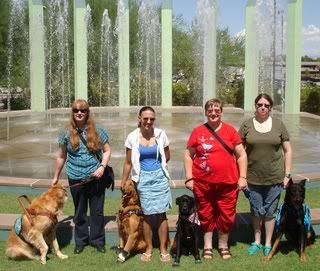Shadow Walker
Posted : 9/16/2008 5:37:14 PM
If you need a "companion" dog then its not a Service Dog. Companion Dogs are also known as Emotional Support Animals and they have NO public access rights. They can't go too the movies, stores, etc.. For you to have a Service Dog you must life alterating medical disorder that falls under the ADA guidelines. For an ESA you must have a medical letter for renting and those rules fall under the Fair Housing Act. The letter has to be renewed yearly.
There are plenty of Owner Trained Service Dogs and I'm the proud owner of one. The disabled person should do the training with help if possible from professional trainers. If your mom has a qualifiying disability under the ADA, then she has to do the training with help for the dog can work with her. It's not like a program dog .. An OT Service Dog is specifically trained for your disability. The dog has to be trained to migate the owners own disability. They must learn tasks (at least 3 tasks to migate your disability). It takes up to 2 yrs to train your own Service Dog. You have to train your dog in many commands: Paws Up, Off, Down, Under, Sit, Stay, Wait, Leave It (most important command - NO Service Dog can touch or pick up food from the floor - So, if your dog is use to taking tidbits from the dining table it will have to be stopped), Ignore, etc... I highly recommend the books from Top Dog - http://www.topdogusa.org/index.html This an ADI based program. You must have a medical proof from your doctor stating that you are disabled under the guidelines of the ADA. Also, check out the Psychiatric Service Dog Society @ http://psychdog.org/ They have different Service Dog tasks that will migate their handlers disability.
Service Dogs can be any breeds... even Mutts. Shadow is a rescue and he's a Lab/Boxer Mix. I've seen Dobbies, Rottis, German Shepards, Pit Bulls (and mixes), Golden, Labs, Chessapeake Bay Retreivers, Great Danes, Akita's, Standard Poodles, etc. used as Service Dogs. Also, many minature breeds like Min Pins, toy poodles, yorkies, etc being trained as a Alert Dogs for Psychiatric Service Dogs, hearing, etc.... Your dog should be sound and have your Vet approve your dog as a Service Dog candidate...
Service Dogs don't need to be certified. I choose certification because I wanted everyone to know that I have a well trained Service Dog that went up and beyond the requirements. I followed the guidelines of Assistance Dogs International.
I belong to a very new organization called "The Foundation for Service Dog Support".. Our goal is to have a National program of certified evaluators give a Certification exam to OT Service Dogs. Unlike SARA (Service Animals Registry of America) which will give you a card stating your dog is qualified as a certified service dog, but with no proof that the dog is in fact a service dog or a pet that wants to go with their owners. FSDS will certify ownly qualified dogs who meet the highest standards of the organization. Please check out the FSDS at http://fsds.ws/ .. I will be a future evaluator in my area of AZ. I'm now a AZ Canine Ambassador for the organization.


SHADOW THE FOUNDATION for SERVICE DOG SUPPORT first AZ Meet and Greet
TASKS FOR SERVICE DOGS
Assistance in and out of the home – Choose three
- Picking up dropped items or items told to retrieve
- Holding items for you
- Carry items for you, even to another room
- Opening/Closing household doors
- Opening/Closing cupboard doors
- Bringing a drink from a kitchen cupboard
- Opening the refrigerator door
- Bringing a soda from the refrigerator
- Putting dog toys away
- Fetching a cane, walker, braces, crutches or other equipment
- Assisting with transfers to or from the bed, toilet, bathtub, sofa, chair, car or bus
- Reaching an item for you, i.e. clothing items, shoes, coat, hat
- Assistance with undressing – removing shoes, coat or other clothing items
- Answering a ringing phone
- Bringing you the emergency phone or calling 911 for you
- Answering a knock at the door/doorbell
- Barking at a knock at the door/doorbell
- Cleaning up, i.e. putting trash in wastebasket and/or recycle bin
- Fetching a First Aid Kit, medication bag, bottles of pills, asthma puffers, etc
- Helping you up off the floor, off of furniture or helping you up from a fall
- Assisting with stairs or elevators
- Turning On/Off light switches
- Assisting with laundry, i.e. washing, drying, putting clothes in/out of basket
- Retrieving purse, wallet, school book bag or dog’s backpack
- Assisting with mail – retrieving dropped mail or newspaper
- Retrieving a person for help
- Taking a note/message to another family member, coworker, teacher, peer, etc.
- Wheelchair maneuvering
- Support for walking
- Water safety, i.e. shower, bath tub, swimming pools, lakes, etc
- Assistance with financial transactions – paying for store item
- Assisting with a shopping cart/hand basket
- Pushing elevator buttons, automatic door buttons or door bells
- SAFELY loading and unloading in a vehicle
- SAFELY maneuvering through a parking lot
- Assistance in public bathroom
- Advanced retrieving, i.e. taking an item off a store shelf and placing in you basket
- Barking on command
- Putting an item away for you, i.e. putting items on a shelf, shoes in a closet
- Taking an item to a different room
- Retrieving an item from a different room
- Emergency body pull